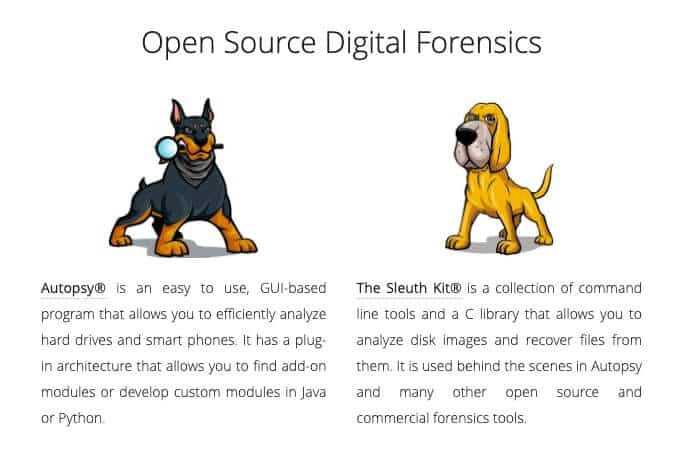
A computer forensics analyst, also referred to as a computer forensics investigator, forensic computer analyst, or digital forensics examiner, collects and analyzes digital data.
Computer forensics analysts find positions within private firms as well as government organizations. Roles in this field usually require at least a Bachelor’s degree in computer forensics or a related field and potentially some specific certifications.
Want to learn more about becoming a computer forensics investigator and whether it could be the right fit for you? We’ve compiled all the information and resources you need to start planning your career.
Read on to find out more about what a computer forensics analyst does and the skills, education, and certifications required for the role. We reveal how to become a computer forensics analyst and cover other important information such as salary expectations and where the best jobs are.
What is computer forensics?
Computer forensics, also referred to as computer forensic science, pertains to evidence that can be found on computers. It is used to investigate computer crime, as well as gather evidence in other types of crime.
The goal is to probe computers using forensically sound methods. Computer forensics is based on data recovery principles and techniques, but also involves extra practices and guidelines such that any evidence collected will be legally viable and hold up in court. Ultimately, computer forensics investigators seek to identify, preserve, recover, and analyze pertinent data, and present facts and opinions about the information.
When collected correctly, digital evidence is considered reliable in many court systems. Computer forensics has been used to help convict criminals for decades, and has featured in a wide range of cases including prosecutions for murder and kidnapping.
The terms ‘digital forensics’ and ‘computer forensics’ are often used interchangeably. However, computer forensics is really a branch of digital forensics. Computer forensics covers computers such as desktop PCs and laptops, whereas digital forensics pertains to all digital media, including smartphones, hard drives, flash drives, digital cameras, and more.
What does a computer forensics analyst do?
The role of a computer forensics investigator will vary depending on the organization you’re working for, but some of the tasks and responsibilities you can expect to find in a forensic computer analyst job description are listed below.
Here’s what a computer analyst does:
- Collaborate with law enforcement officers to extract digital evidence both in a lab environment and on-site
- Examine and compile digital evidence and report and present findings
- Conduct interviews discussing digital evidence with witnesses and suspects
- Provide training to law enforcement personnel regarding how to handle computer evidence
- Determine and advise on the reliability of computer evidence
- Use digital data to help locate suspects
- Secure data that is pertinent to investigations and maintain the chain of custody
- Determine how a suspect gained unlawful access to a system
- Apply security measures to prevent unlawful access and data breaches
- Train end-users on security protocols
Most roles involve the use of specialist software such as Sleuth Kit/Autopsy, Plaso, and Bulk Extractor to assist with investigations. As this is an advancing field, most computer forensic analysts are expected to participate in ongoing training and education to keep up with the latest advances.
What skills are required to become a forensic computer analyst?
As with most fields of cybersecurity, there is a particular skill set that will enable you to carry out a role as a forensic computer analyst effectively. Based on the general job description above, as well as some additional tasks you may need to carry out in this field, here are some of the core skills you will likely need:
- A strong grasp of computer networking and connectivity
- Knowledge of operating systems including Windows, MacOS, Linux, iOS, Android, and others
- An understanding of malware analysis and reverse engineering
- Expertise in cryptography including various encryption and decryption methods
- Knowledge of digital storage methods
- Programming skills
- A comprehension of hacking techniques
- Strong ethics to ensure proper handling of data
- An understanding of the legal aspects of investigations
- Exceptional knowledge of chain of custody best practices
Aside from the hard skills above, a role as a computer forensics analyst also requires certain soft skills that are common to many areas of cybersecurity. These include attention to detail, analytical skills, effective communication skills, and a strong desire to learn and develop professionally.
How to become a computer forensics analyst
So you’ve decided that a role as a computer forensics investigator might be right for you. What now? Below are the steps you need to take to have a successful career in computer forensics:
- Devise your plan
- Earn a degree
- Consider certifications
- Search for jobs
- Continue your learning
Let’s look at these steps in a bit more detail.
1. Devise your plan
Even if you know what general direction you want to take, it’s a good idea to map out a career plan before jumping in. The type of education and certifications you need will hinge on factors such as whether you want a government or private role, and what area of computer forensics you’re most interested in.
Research some of the positions you might aim to apply for and find out what the general requirements are. You may consider contacting recruitment teams directly to ask if certain qualifications could make you an especially good fit for a given role.
2. Earn a degree
Most computer forensics roles require at least a Bachelor’s degree. There are specific degrees available in computer forensics, but you don’t have to go that route. For example, a degree in criminal justice, computer science, or related fields, could be enough to land you a job in the field.
Here are a few of the top computer forensics Bachelor’s degrees to consider.
Already have a degree in a related field? If so, contact recruiters to find out if your qualification is acceptable, and you can move on to thinking about certifications.
3. Consider certifications
Although a degree is highly important for this role, so are certifications. Many positions will require specific certifications, so if you have a particular role in mind, be sure to check first before wasting time on the wrong certification.
Here are some of the top computer forensic analyst certifications to consider:
- The International Society of Forensic Computer Examiners (ISFCE) offers one main certification:
- The Global Information Assurance Certification (GIAC) offers several computer forensics certifications:
- The Information Assurance Certification Review Board (IACRB) offers one program specific to computer forensics investigators:
- The National InInitiative for Cybersecurity Careers and Studies (NICCS) also has a certification:
In addition, there are other less specific certifications that could be valuable in some computer forensic careers, such as the Certified Information Systems Security Professional (CISSP) certification.
4. Search for jobs
Once you’re armed with all the education and certifications required, you can start searching and applying for positions. If you have little to no experience in the cybersecurity field, you will likely need to look at entry-level positions. However, if you already have some cybersecurity experience, even if it’s not directly in computer forensics, you may be able to shoot for a mid-level position.
Here are some handy resources for government positions:
If you’re looking for work in the private sector, here are some top companies that often hire forensic computer analysts:
You’ll also find plenty of job openings on your standard job sites such as LinkedIn, Indeed, ZipRecruiter, and Glassdoor, as well as niche sites like CyberSecJobs.com.
See the salary section below for companies that pay particularly well for roles in this field.
5. Continue your learning
Scored a job and feeling great? Don’t slow down now. You can use this momentum to continue your education and reach your career goals sooner. Options for further learning include pursuing a Master’s degree or obtaining additional certifications.
Many of these (even Master’s degrees) can be completed part-time and online, making it possible to fit them in alongside a job. You may even find that your employer encourages ongoing training and will offer financial support or give you time off to pursue your studies.
Here are a few online Master’s degrees to consider:
- University of Central Florida’s Online Digital Forensics, MS
- Champlain College’s Digital Forensic Science Online Master’s Degree Program
- University of Maryland’s Digital Forensics and Cyber Investigation Master’s Degree
That said, you may want to veer from your current field and explore other areas of cybersecurity. For example, a role as a computer forensics investigator could lead to a position as a security consultant or security architect, both of which typically pay higher salaries.
Computer forensics salary
Of course, an important factor in choosing a career in any field is salary expectations. Depending on which site you visit, you’ll find a range in terms of the average computer forensics salary. PayScale is a salary aggregator that is typically regarded as reliable for this information. According to PayScale:
- The average salary for a computer forensics analyst is $74,199.
- The range of pay for computer forensics analysts is $50,000–$120,000.
There is also valuable data to show how you can expect your salary to increase with experience:
| <1 year | 1–4 years | 5–9 years | 10–19 years | 20+ years |
| $63,000 | $70,000 | $86,000 | $101,000 | $101,000 |
Want to shoot for the best-paying jobs? According to information from PayScale, here are some of the top employers of forensic computer analysts and what they pay for the role:
- Federal Bureau of Investigation (FBI): $77k
- Mantech International Corp.: $90k
- Transperfect: $77k
- Booz, Allen, and Hamilton: $120k
- Sony Corporation of America: $71k




